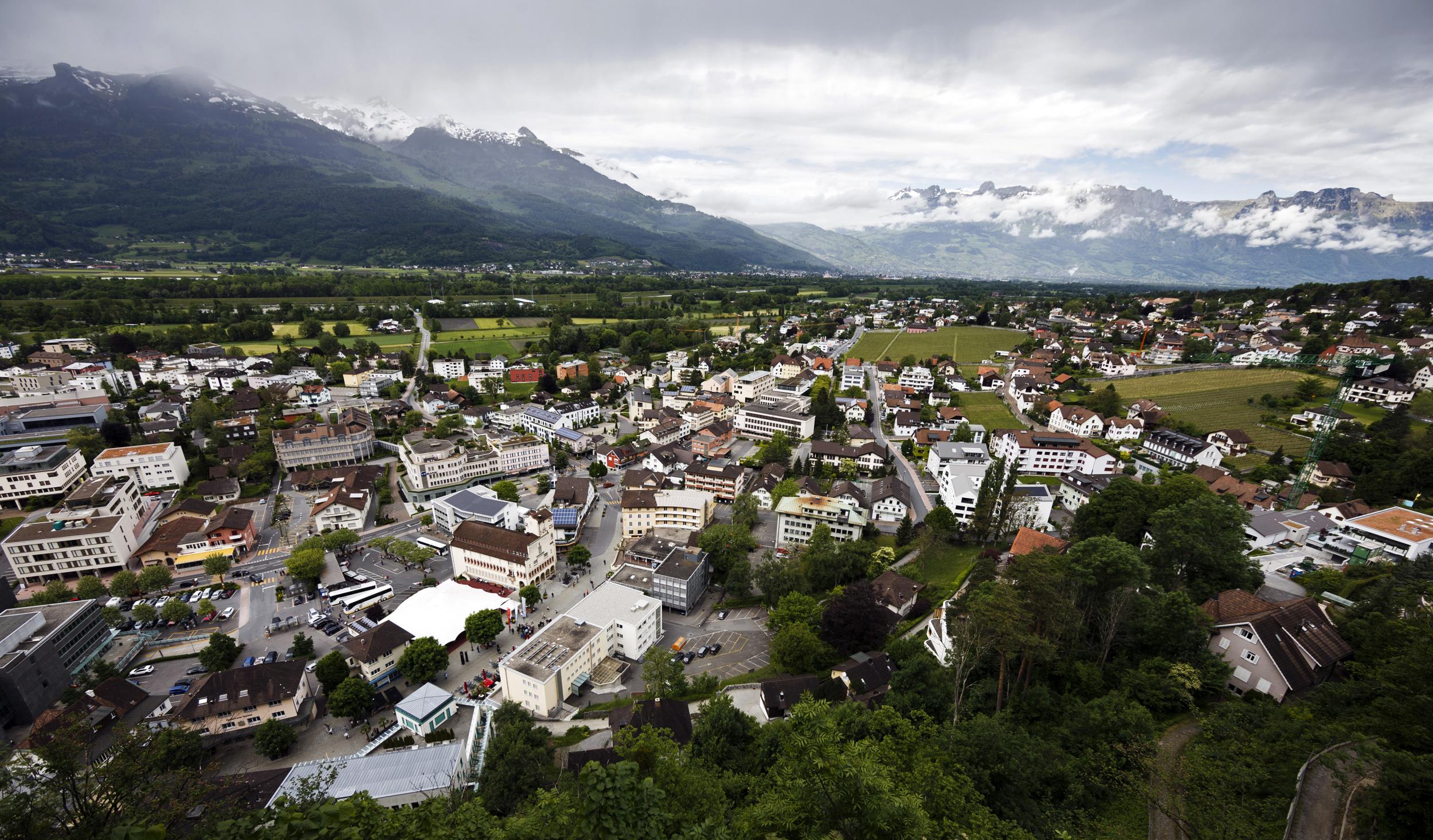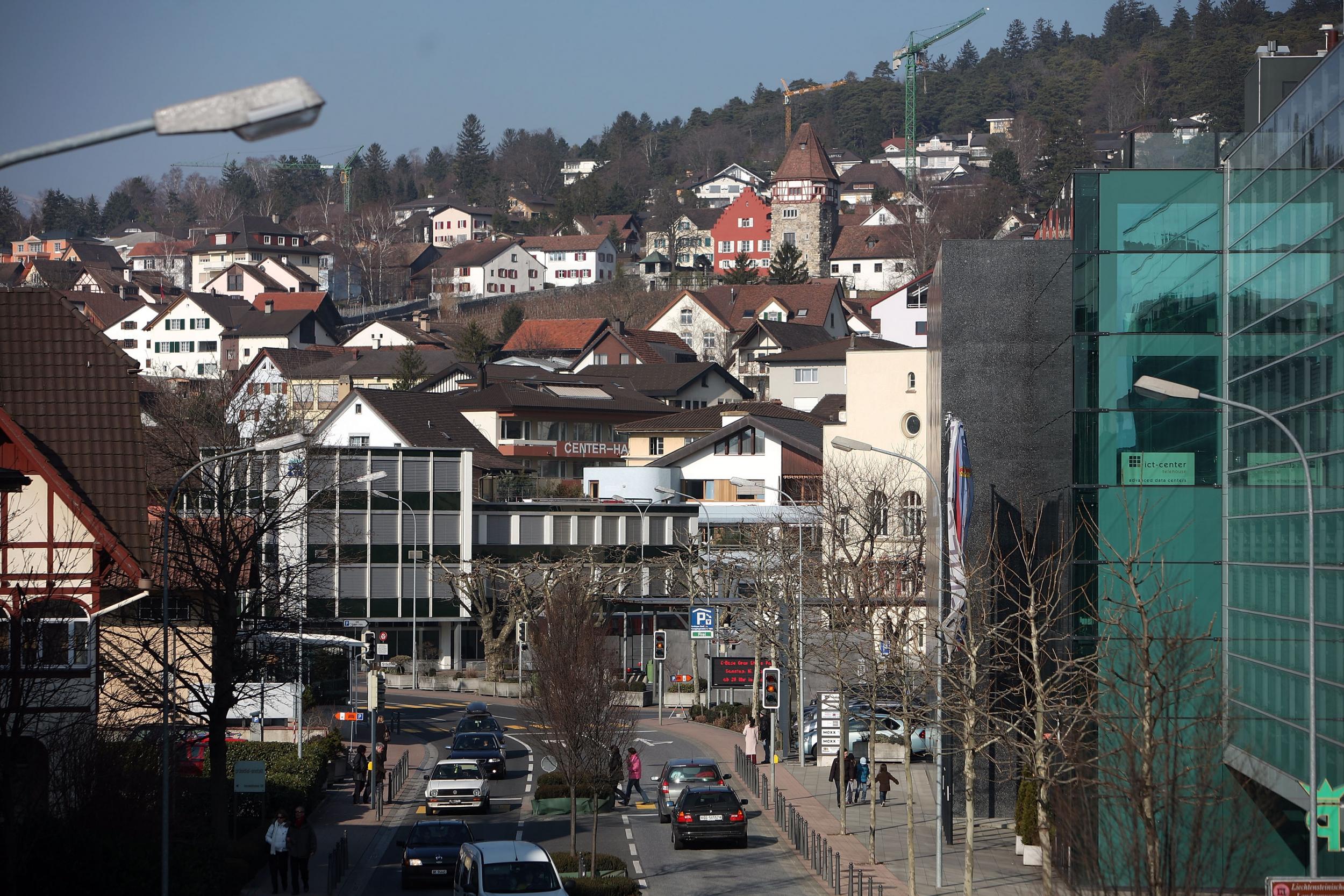Liechtenstein: The mysterious tax heaven that's losing the trust of the super-rich
The tiny principality of Liechtenstein attracts the super-rich for its secrecy and security but, as a bitter legal case shows, there's a price: all legal right are held by the trustees

The ultra-discreet Principality of Liechtenstein is Europe’s least-visited country, inhabited by the fewest people (population of 37,000) and with very little land (62 square miles), but it contains the most secrets of the international super-rich and ruling dynasties. Here in this mysterious tax haven – squeezed into half a valley between Austria and Switzerland – there are more registered companies than citizens and it has the highest gross domestic product per person in the world.
And so it is not surprising that wealthy tycoons and companies have chosen this tiny Alpine retreat, which specialises in administering offshore trusts and foundations to protect their assets and secure them for their family and future generations. Even well-known companies such as furniture giant Ikea deposited an estimated $11bn (£8bn) in a foundation registered in Liechtenstein.
For the past 50 years Liechtenstein has been the gold standard for wealthy people and ruling families, notably Russian oligarchs, the late publisher Robert Maxwell and the Saudi royal family, to preserve and protect their assets via impenetrable trusts and foundations. A vast, luxury mock-Tudor mansion called Kenstead Hall on The Bishops Avenue, Hampstead, north London, owned by the late King Fahd of Saudi Arabia, was registered via a complex and obscure Liechtenstein entity called the Asturion Foundation. Secrecy and security has been their consistent feature and there have been no leaks of confidential documents from Liechtenstein.
However, what is less well known is that this secrecy comes with a heavy price – under Liechtenstein law the beneficiaries of a discretionary offshore trust have no legal rights. If there is a dispute with the trustees, the grievances of the beneficiaries cannot be heard in legal proceedings – even if they have reasonable grounds to challenge a trustee’s actions. Under the laws of the principality, legal rights are held by the trustees. And so if there is a dispute with the trustees, the beneficiaries can be left with no access to their own assets.
This has been the experience of Tamar Perry and her family. For the past two years, Ms Perry has been waging a bitter legal war against a trust company in Liechtenstein called the Lopag Trust and its directors, Louis Oehri and Dominik Naeff. Her family has been unable to gain access to the family’s vast fortune in the trust that was settled by her father, the late Israel Perry, an Israeli tycoon. And she blames the principal trustee Dr Dieter Neupert, a Swiss lawyer.
Israel Perry agreed for the assets to be managed by the trust for tax efficiency purposes and to keep the money in the family and secure the future of their children and grandchildren. But once the assets were in Neupert and Lopag’s hands, they took complete control and retained all the power. “Our position is watertight,” Lopag tell their clients.

At first Tamar Perry trusted the trustee. “Dieter [Neupert] was the family’s confidant,” she says. “He waited for my father to die and then he pounced on my assets. The moment I confronted him, all hell broke loose. He came across as a nice man, a smooth talker and very intelligent. But now, after dealing with him in person for more than three years I realise that he was very dishonest.”
And so, since 2016 the Perry family has filed a number of civil lawsuits and criminal complaints against Neupert, Naeff and Oehri in the UK, US, Liechtenstein, Switzerland and Cayman Islands, alleging that they embezzled monies from her father’s assets which were deposited in Liechtenstein trusts.
Neupert strongly denies all the allegations, is vigorously contesting all the lawsuits against him but refuses to comment. A spokeswoman for the Lopag Trust said that, because of the rules governing trusts in Liechtenstein, she “is currently limited in her ability to answer questions”. However, she claims that Tamar Perry is engaged in “a global smear campaign against Lopag”.
The Liechtenstein court has concluded that neither Tamar Perry nor the other beneficiaries have any legal rights. The judge ruled that not only did the beneficiaries have no rights or standing; they actually owe money to the principality and compelled them to pay the legal costs for their case. The Perry family was shocked by the judge’s decision. “You wake up in the morning and all your possessions, bank accounts, the house you live in and your mother’s home suddenly belong to someone else”, she says. “It is a nightmare”.
Usually there is a protector whose job is to protect interests of the trust’s beneficiaries. But in this case the court in Liechtenstein appointed Peter Schierscher as the protector. According to the Perry family, this appointment made the situation even worse and contradicted the letter of wishes left by the settler of the trusts. This appointment gave the Lopag Trust the ability to continue to withdraw money from the Perry Trust without the family’s consent. So far, according to court documents, the Lopag Trust have withdrawn an estimated €10.5m (£94m) in “management fees” – none of this could have happened without the approval of the new “protector”.
But now Tamar Perry is fighting back. She is trying to persuade the authorities to issue international arrest warrants against the Lopag trustees and Dieter Neupert. Court documents allege that they have also been involved in money laundering but, amazingly, this has had little impact in Liechtenstein – the Lopag Trust continues to operate freely and does not feel threatened by the legal proceedings.
The Perry family has also hired the eminent and respected QC Steven Kay, who is a leading authority in criminal law. He agreed to act for the family after reading the judge’s court rulings. Kay was stunned by the judgement and believes that wealthy families should be warned about the dangers of allowing their assets to be managed and controlled by discretionary trusts in Liechtenstein.
What is surprising about the Perry case is that Liechtenstein is reliant upon the vast revenue provided by the clients of the trusts and yet their interests and legal rights are not being protected. The beneficiaries of trusts that represent the source of the country’s wealth have no legal recourse of action and so they could well move their assets to other offshore locations where there is more legal accountability. This could add to the growing pressure on offshore tax havens and wealthy individuals to be more accountable for their assets and disclose the source of their wealth.

And so the Perry case has huge implications for the offshore world – if people who have deposited their wealth in Liechtenstein trusts become aware that they have no legal rights, then many of the trusts will be disbanded.
“I just want to warn people that if they are thinking of placing their assets in a trust registered in Liechtenstein, then they should run away as fast as possible because they will find that the trustees will become the beneficiaries,” says Perry. “And then the judge and Liechtenstein Trust committee will take the side of the trustees. I’m sure I’m not the only one who has been set up in this way but I intend to be the last one. The lesson here is that you cannot always trust the trustees.”
The prospect of appealing to a higher judicial or political authority is not promising either. Ultimate power resides with the current ruler, Prince Hans-Adam II, Europe’s richest monarch with an estimated fortune of $4bn and one of the world’s finest art collections, notably the largest private haul of works by Rubens.
While Liechtenstein is a constitutional monarchy, it is hardly enlightened or democratic. Women were only granted the right to vote in July 1984. It took a referendum, in which only men were allowed to participate, to give women the vote in elections and it only passed with 51 per cent in favour.
The Prince portrays himself as a benevolent ruler, but in 2003 he proposed a new constitution which gave him the power to veto any law and dismiss any government or minister. He threatened that if these constitutional changes were not agreed, then he would convert some of the royal property for commercial use and move to Austria. The new constitution was passed in a referendum with 64 per cent in favour.
Today Liechtenstein portrays itself as taking action against fraud, tax evasion and money laundering. In 2015 it signed an agreement to share more exchange of information in case of tax disputes. And the OECD has removed the principality from a blacklist of countries that has been uncooperative on tax investigations. But the ruler’s own track record on financial integrity is not always healthy. A US Senate subcommittee on tax haven banks said that the LGT Bank, which is owned by the Prince’s family and on whose board they serve, was “a willing partner and an aider and abetter to clients trying to evade taxes, dodge creditors or defy court orders”.
Meanwhile, the Perry case shows no sign of disappearing and so Liechtenstein will remain in the spotlight. The civil lawsuits have not been settled and a criminal complaint is being investigated by City of London police. It remains to be seen how the courts around the world will rule.
Update: An earlier version of this article erroneously suggested that Dieter Neupert was on an Interpol list, in respect of Tamar Perry's attempts to persuade the authorities to issue an international arrest warrant against him. In fact, Mr Neupert is not on any Interpol list. 19/3/18
Join our commenting forum
Join thought-provoking conversations, follow other Independent readers and see their replies
Comments
Bookmark popover
Removed from bookmarks